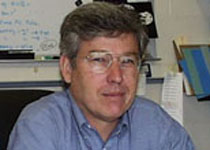
Professor Walsh is interested in the molecular basis for cellular morphology. Much of his work in the past has focused on the regulation of the synthesis and assembly of eukaryotic flagella, basal bodies, and the microtubule cytoskeleton. More recently his laboratory has become interested in the molecular organization of the nucleolus. Both areas of interest have been pursued by studying the differentiation of the amebo-flagellate Naegleria gruberi. Amebae of Naegleria are able to differentiate into swimming flagellates in a highly reproducible and synchronous fashion. During this process they are capable of the de novo synthesis and assembly of basal bodies as well as flagella and a microtubule cytoskeleton, all in less than two hours. Nucleoli are known to be the sites of ribosomal RNA synthesis and ribosome assembly. The recent discovery in Dr. Walsh's laboratory of a system in which soluble components of the nucleolus can be reassembled in vitro has, for the first time, provided a way to examine the assembly of this important organelle. The fact that Naegleria have an exceptionally large nucleolus and the fact that all the ribosomal genes are present on about 4,000 copies of a small circular plasmid provide a rich context in which to explore questions of the molecular basis for the structure and function of nucleoli. Professor Walsh's laboratory makes use of a combination of light microscopy (phase contrast, DIC, fluorescence, and confocal) and electron microscopy (transmission and scanning) using monoclonal antibodies to identify specific cellular components. Morphological data are combined with the results of cell fractionations and data from the cloning and sequencing of selected genes to try and provide an integrated picture of how cellular morphology determines and is determined by function. Current projects involve the study of the in vitro reassembly of nucleolar proteins, DNA, and RNA; the organization and distribution of nucleolar proteins during mitosis in both Naegleria and in mammalian cells; and the synthesis and assembly of flagellar basal bodies.
